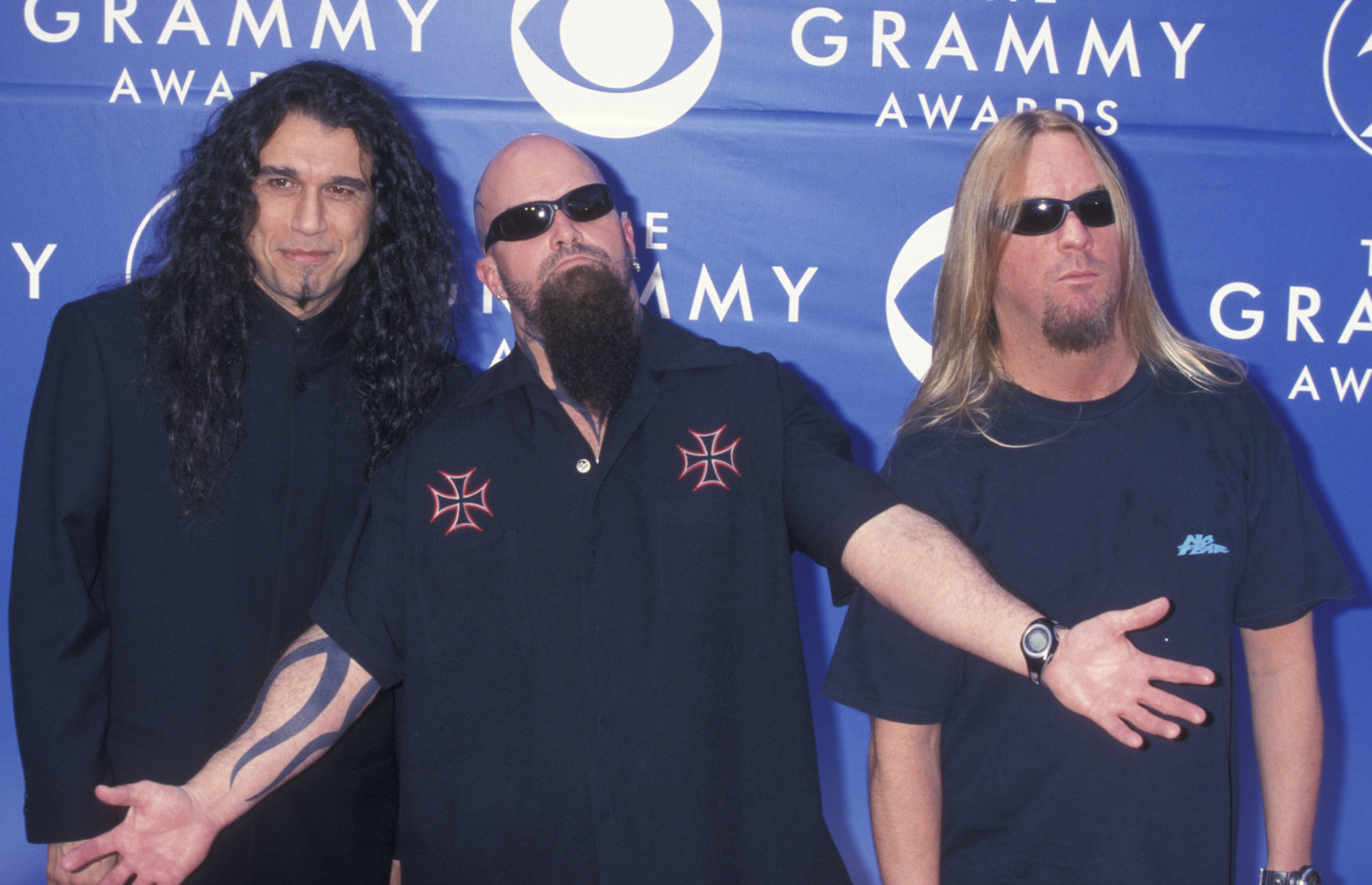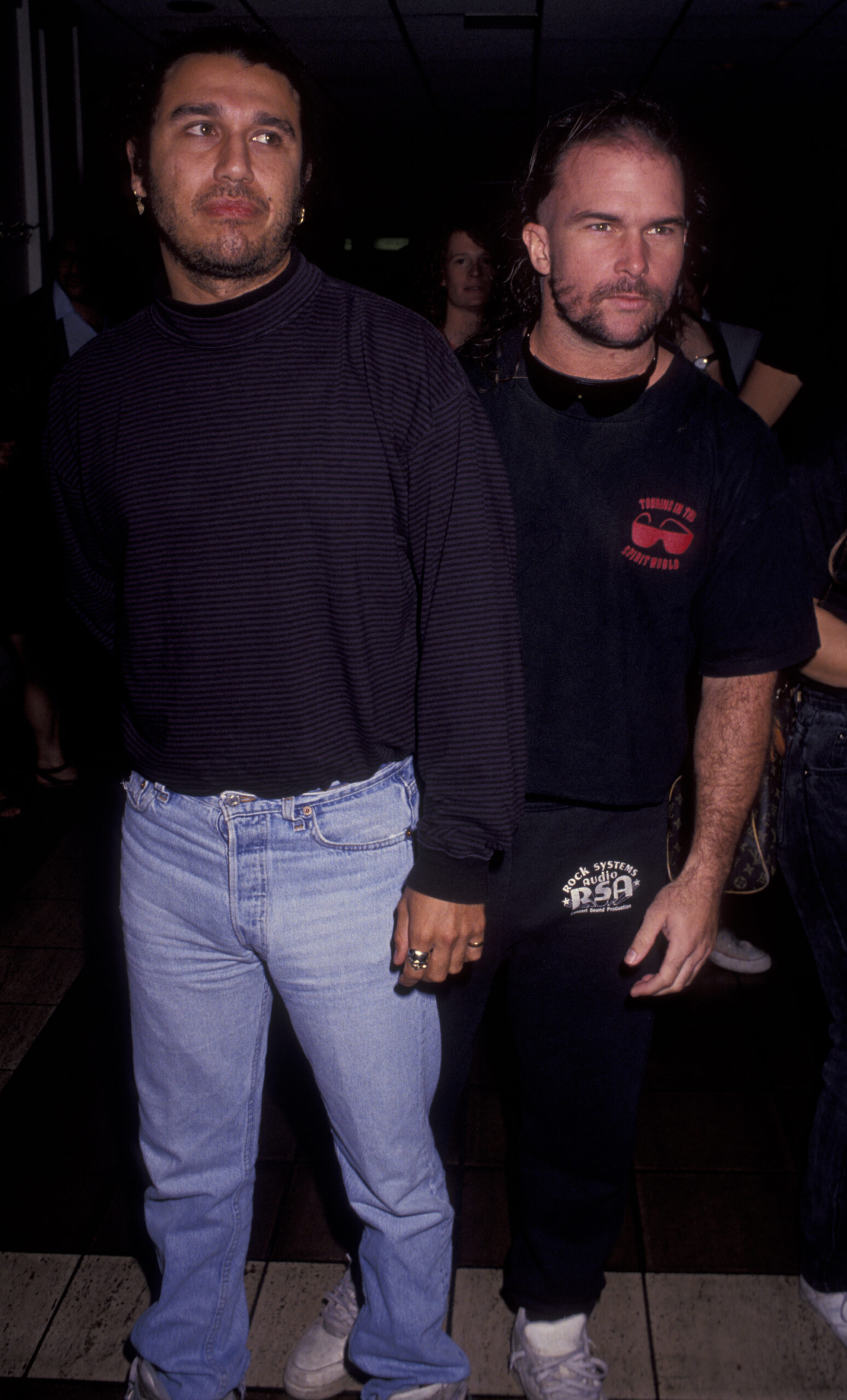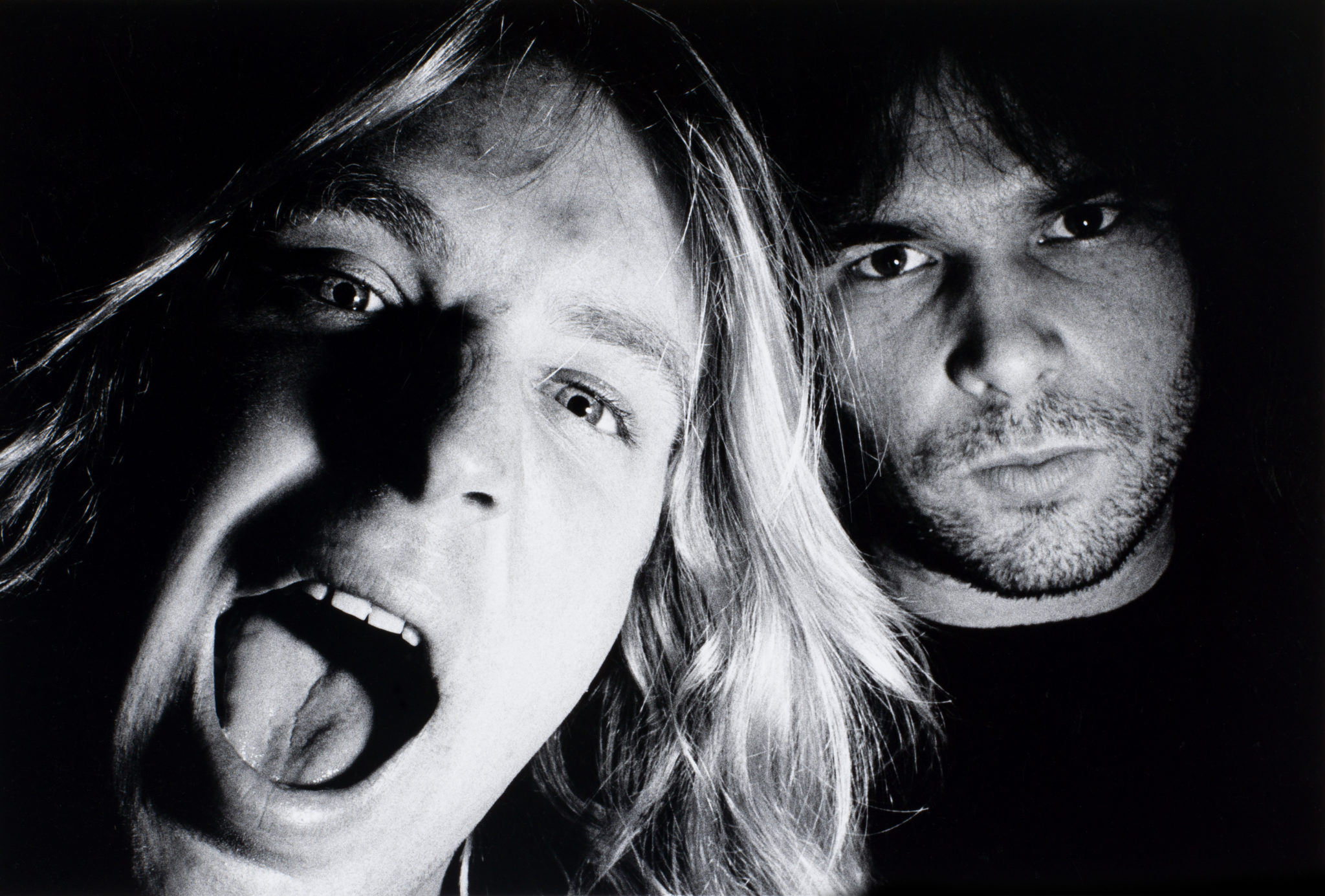This article originally appeared in the May 1989 issue of SPIN.
I do a talk show called “TALK-BACK with Bob Larson,” syndicated in nearly 200 markets.
Not just any talk show. A religious talk show that presents the Christian perspective on topics ranging from sex to suicide, racism to rock ‘n’ roll.
I’m a Christian. The born-again kind. That means I believe Jesus Christ is the Son of God, who died for our sins and rose again from the dead to give us the gift of eternal life.
They play in a heavy metal rock band.
Not just any metal band. A black/thrash/speed metal band with lyrics describing sex with corpses and songs offering prayers of praise to Satan.
Which presumably means they are Satanists. Why else would Slayer sing, “Warriors from the gates of hell/In Lord Satan we trust” (“Show No Mercy”)?
Am I genuine about Jesus? In my teens, I was a professional rock ‘n’ roll musician. In my early 20s, I became a Christian. Now, Christ is my Lord, and I look forward to spending eternity with Him in heaven.
Are they serious about Satan? Does Slayer look forward to partying with the Evil One in the infernal inferno? To find out, I went to West Germany, where Slayer was in the midst of its World Sacrifice Tour. Slayer on tour in the land of Bach and Beethoven. Bob Larson close behind. The ultimate irony.

A few weeks earlier, a Pan Am plane left Frankfurt and blew up. I landed safely in Frankfurt, but the next night in a Hamburg concert hall, things exploded. Excuse the pun—all hell broke loose.
If Slayer was going to play for the devil, they picked a poor place to do it. The hall was cavernous and cold. No heat. You’d think with Lucifer around, the place would’ve been a little hot, but no. It was freezing. Backstage, Slayer shivered, hunkered down like four lost sheep far from home. Onstage, they became fire-breathing demons of rock ‘n’ roll.
To chants of “Slayer, Slayer,” the band came on-stage, appropriately dressed in black. Guitarist Kerry King wore a leather shin guard with steel studs in the form of an upside-down cross. Guitarist Jeff Hanneman wore a T-shirt saying, “Slaytanic Wermacht” (war machine). Vocalist Tom Araya’s T-shirt declared, “Sex, Murder, Art.”
They had the look of studied evil. They must have practiced for hours in front of a mirror to effect their snarls of contempt for decency. Minutes earlier, they were belching beer and tossing around a small rubber football. Now, in the midst of the fog machines and the thunderous roar of 3,000 fans, they were the embodiment of evil.
“Gutten Nacht,” Araya called out, attempting a little German. The fans roared with approval. He could have spoken French for all they cared. They weren’t there for small talk. They wanted to hear the songs of Satan sung syllable-for-syllable, note-for-note, just like on their records. They lip-synced the words, even though the majority had no idea what they were saying. Just the obvious devilish catch phrases. They all said “f***ing” on cue, but did they know they were singing about doing it to a corpse? Did it matter?
Every comment was canned. Night after night, the same song intros. Little spots of masking tape on the floor showed everyone where to stand to catch the right rigging light at the proper moment. Nothing was spontaneous. Even Araya’s eyelid, which arched slightly when he said “Satan,” appeared to be choreographed. Every note of every riff, every scowl, the same.
No one in the band was nervous. They had been through this a zillion times before. “Is this how Anton LaVey of the Church of Satan feels after celebrating his umpteenth black mass?” I wondered. The lighting man played his big board like a virtuoso pianist. Now the blue light goes on Araya. Next, Hanneman is stepping to the foot of the stage at the spot marked “X.” Hit the red floor spot shining upward under his chin so it creates eerie shadows, as he glowers menacingly. (Remember when you did this as a kid, putting a flashlight under your chin while you told scary stories in the dark?)
The audience scowled back. Except when I took their pictures. Then, they smiled. No one heard me say cheese, but the sight of a camera caught them off guard and for a brief moment they forget where they were. The tension in their facial muscles relaxed. After the flash went off, something clicked and their eyes narrowed again. Their lips curled in contempt of propriety, and they returned to their devilish demeanor.
Behind Slayer, the stage backdrop featured their stylized pentagram logo, centered above drummer Dave Lombardo. On either side of the Satanic symbol were two six-foot stained glass windows superimposed with a cross—upside down, naturally. The deafening roar of 120 decibels (112 is the pain threshold, like standing next to a jet taking off) launched the baddest boys in rock ‘n’ roll into “Spill the Blood” (“Spill your blood, let it run onto me/Take my hand and let go of your life . . . /You’ve spilt the blood/I have your soul.”).
I groaned. “It isn’t going to take long to find the devil around here,” I thought with self-righteous smugness.
I already knew a lot about heavy metal, but actually seeing a “Satanic” band in action confounded my previously comfortable conclusions. I had thought it was an open-and-shut case. Bands like Slayer, who use occult symbols and sing of Satanic ceremonies, were the devil’s doing. Like a fundamentalist Sherlock Holmes, I set forth to unmask the deceiver. But where was Lucifer?
How fitting that the madness of metal mania would strike West Germany, a country that once boasted Europe’s richest cultural heritage. Before the parents of Slayer fans were born, Nazi madness unleashed an insane onslaught of evil that knew no reasonable bounds. Demagogic rallies and sterile architecture served to promote the Aryan ideal. Mass psychology triumphed over reason. Was black metal breeding the same insensitivity to logic? Were symbols of evil (the pentagram instead of the swastika this time) once again inciting legions of the discontented to overthrow an existing order?
Fifty years ago, Germans goose-stepped in exacting regimentation, stiff-armed salutes sanctifying der Fuhrer. In Hamburg, German metal maniacs thrust Satanic salutes (pinkie and index finger extended) upward and slam-danced to the fastest rhythms in rock. They knew every word, even if they weren’t sure of the meaning. Their favorite song was “Angel of Death,” about Joseph Mengele, the butcher of Auschwitz (“Sadist surgeon of demise/Sadist of the noblest blood . . ./Monarch to the Kingdom of the Dead”). The song is a horror genre account of Mengele’s machinations. The crowd reacted violently. Were they incensed that their elders allowed him license? Did they secretly long for the glory-gory days of the Third Reich? Probably neither.
The whole scene was so emotionally two-dimensional, it didn’t inspire the brain to think past the surface flash.
Where was Lucifer? Satan could be in the crowd, a beer-buzzed, wasted bunch that the band referred to backstage as “German vermin.” Their metal regalia was an open invitation to evil. Everywhere, there were thousands of jean jackets, backs emblazoned with demonic deceptions . . . horned goat baphomet symbols of Satan . . . gruesome images of devils . . . more upside-down crosses than a denizen of demons could concoct in a month. A strange one with sexual overtones depicted a naked woman lying on her back, legs spread apart at the junction of the inverted crucifix cross-members. Black magic pentagrams declared, “Welcome to Hell.” Was Lucifer lurking there? Nah. Too obvious.
Perhaps I’d find him in the pit, that five-foot-wide section between the stage and the steel restraining bars that hold back crazed crowds. The pit is the Promised Land every true headbanger longs for. How does he cross over Jordan to get there?
It starts in the back of the crowd. A kid leaps into the air and somehow lands on top of the audience. Heads, shoulders and outstretched hands support him. Excelsior! Onward to the pit! Gradually, he makes his way forward, pushing or being pushed. He crawls on his back and stomach, surging with the intensity of Jerry Rice heading for a touchdown.
One last lunge. Head over heels, he somersaults the last few feet until he lands head-first, or hopefully feet-first, beyond the barrier—in the pit. Then, he is ungraciously escorted, to put it nicely, by security to the side of the auditorium and sent to the back of the crowd. Why do they do it? It’s macho. It’s fun. It’s what you do at metal concerts. Does anyone ever get hurt? Sometimes, but like players in an NFL title game, headbanging pit-divers quickly get back on the field and do it again. Satan may live in the Pit, but not this one.
Perhaps the devil could be cornered during some secret ceremony of conjuration after the show on the tour bus . . . glorified Winnebagos hosting a rolling revelry on wheels. I’d heard all about groupie orgies and drug-drenched bacchanalia. Slayer’s bus was a bland bus, although a luxurious one. Two TVs. Two VCRs. A supply of videos, mostly horror flicks. A john (number one only, please). A microwave to cook the after-concert catered meals. A center lounge (where a lot of drinking and beer-belching goes on). And in the back, bunks. Six of them. Claustrophobics like me, beware! Satan wouldn’t want my top cubicle.
Where were all the porn videos? After all, this was a Satanic rock ‘n’ roll tour. The worst corruption I could find was one slightly used Playboy magazine they looked at again and again. It stayed on the couch in the center of the bus. Every time a band member sat down, he picked it up, thumbed through it, and laid it back down. The same breasts, the same pubic hair, the same silly poses. Either she was dynamite or these guys were really bored.
Probably the latter.
“I thought I’d freeze my butt off before we went onstage.”
“My drum solo just didn’t make it tonight. Something wasn’t right.”
“How many hours until we get to the hotel?”
“So, Paul, what was the gate tonight?”
“Hey, Jeff, you’re into war stuff. I saw this store with some really nice German winter military jackets.”
“Ice, where’s the ice? They’re supposed to bring it on board the bus every night after the show. You just can’t get ice in Europe.”
Idle conversation. Kerry kept counting the days. “Just 19 days left,” he said to me. “When I saw Paul, our tour manager, as I got off the plane in Frankfurt to start the tour, I said, ‘Paul, 30 days left … 30 days left until it’s over, and I can go home.'”
None of them wanted to be here. It was a job, nothing more. No colored condoms backstage in the rider for these guys’ contract. They weren’t interested in groupies, although there aren’t that many girls at a black metal concert. The ones that do attend look slightly used and very diseased.
No one seemed to mind my presence. I was part of their job, too. So what if I was looking over their shoulder? They were getting a feature story, and that’s all they cared about. Backstage before the concerts, we talked about God. That’s when they seemed the most conversational. But after the show, on the bus, they wanted to be left alone.
I felt they weren’t doing anything different because I was there. They didn’t have to snicker behind my back to tell dirty jokes because nobody laughed much. This wasn’t sex, drugs and rock ‘n’ roll. This was boredom and business.
“I want to watch ‘Gremlins’ tonight.”
“Ah, come on. You’ve seen that six times already.”
“My voice is hoarse. I didn’t towel down fast enough when I got offstage.”
“Probably that smelly T-shirt you’ve been wearing for the last five nights onstage. Why don’t you change it?”
“Hey, driver, can we stop at the next gas station? I need some postcards to send my girl back home.”

The only time Slayer spends on the bus is from midnight to 6 a.m., en route to the next city. No room and no opportunity to sacrifice young virgins on bloody altars or hold seances to conjure the living dead. With nine people aboard, it’s too crowded. Besides, the autobahns are too bumpy. If Slayer truly worshipped the devil, it seems Lucifer could at least provide a Learjet to conjure demons eight miles high.
I did get one brief glimpse of the cloven-hooved Deceiver on the bus. Every night during the long drive, the VCR ran constantly—Bruce Lee, Clint Eastwood, Chuck Norris and assorted horror videocassettes. (If you’re looking for film classics, try HBO, not the Slayer bus.) Satan reared his horned head halfway between Donaueschingen and Fuerth. The boys were yukking it up at “Return of the Living Dead” when a nubile actress stripped in a graveyard and lay naked on a tombstone, inviting all kinds of atrocious overtures. But like the occult overtones of a Slayer concert, it was only make-believe.
Was Lucifer living in the lives of the boys of the band? I wasted no time getting to the big “S” question.
“Are the members of Slayer Satanist?”
The four answers I got (in order) from guitarist Kerry King, fellow axeman Jeff Hanneman, drummer Dave Lombardo and bassist/lead vocalist Tom Araya were:
“No.”
“What’s a Satanist anyway?”
“That stuff scares me.”
“I won’t say.”
I had expected a hostile reception from America’s symbols of metal Satanism. In fact, they didn’t know that much about why I was there. They had been given a direction to cooperate with me and that was that. Even black metal bands have to take orders from a higher authority: if not the devil, then their manager and their record company.
“Sorry I disappointed you and left my white polyester suit and red tie at home,” I joked. “Every Christian leader has one,” I said to the drummer. “It goes with the image.”
He looked at me blankly. I realized he didn’t know I was kidding. “We really didn’t know what to expect,” he responded.
In a way, they looked forward to my companionship. Their fans aren’t terribly bright, and they get sick of talking to each other. A new body on the bus is a change of pace.
Kerry King was the first to open up to me. But he didn’t want to talk about God or the devil. “I’ve got a home back in Phoenix,” he said. “Rob Halford of Judas Priest lives down the road. First place of my own I’ve ever had. We’re not a rich band. We keep putting money back into producing the show. Me, I drive a Toyota 4X4.”
Kerry, by his own admission, writes some pretty “sick” lyrics. (Case in point, “Necrophiliac”: “I feel the urge, the growing need/To f*** this sinful corpse/My task’s complete the bitch’s soul/ Lies raped in demonic lust.”) But Kerry says he’d rather spend his time at home in Phoenix with his four dogs and dozens of snakes. He breeds the slimy critters professionally. Reticulate python babies fetch $1,000 each, he gleefully informs me. Kerry claims he’s never read the Bible, though he says if he did he’d probably write some Iron Maiden-type lyrics from Revelation. He looked once at The Satanic Bible, but found it boring and trashed it. He seemed to know little about Christianity, but his eyes flashed indignantly at the mention of Jim and Tammy. The PTL scandal inspired the tune “Read Between the Lies” (“Evangelist, you claim God speaks through you/Your restless mouth full of lies gains popularity/You care not for the old that suffer/ When empty pockets cry from hunger”). Televangelism scandals aside, Kerry says horror movies are his main source of song inspiration.
Jeff seemed the most uncomfortable with the big “S” question. He ascribes to a kind of benign agnosticism. He bristled at the mere mention of any assumed involvement with the Prince of Darkness. Jeff isn’t even sure what a Satanist does or believes. To him, the whole thing is ridiculous. He says all religion is “stupid.” And what of his lyrics like, “Lucifer takes my dark soul/Down to the fiery pits of hell,” from “Necrophiliac”? Watching him onstage gives me a clue. He looks evil. His eyes flash with an aggressive, almost demonic intensity. He’s the headbanger cheerleader, exhorting the crowd to ever more expressive states of frenzy. He admits that something, somewhere in his childhood, angered him. “The stage is my opportunity to release that unresolved aggression,” he freely acknowledges.
Dave is the kid next door you’d want your daughter to marry if he weren’t already happily hooked to Teresa, his wife of two years. (Jeff and Araya are still available. Kerry is in the process of unhitching from a brief marriage he admits was a mistake.) Drummer Dave isn’t comfortable with the band’s Satanic overtones. “Look,” he says, “I didn’t write those lyrics. And I wasn’t in favor of using an upside-down cross as a stage backdrop. I just want to be the best metal drummer in the business.” Ironically, he’s the only one with an occult background of sorts. His Catholic, Cuban-born family dabbled in the Caribbean cult of Santeria. Dave remembers his mother making offerings to obscure deities. Somehow, he retained his reverence for God, probably because of a Catholic school upbringing.
Araya is a mystery. Born in Chile, he came to the US at five years of age. His face persistently glows with mischievous malevolence. He won’t say whether he’s a current or past Satanist. His eyes twinkle at the question, as though he’s hiding some dark secret of the soul or cleverly milking the mystique. He’s an incurable pessimist. “The world is going to end in disaster soon,” he says seriously. “I feel it wherever I go.”
Ironically, while Araya evokes the essence of evil onstage by singing lines like “Praise Satan,” his private life has been closely touched by evangelical ideology. His girlfriend’s parents are devout Christians, and both his parents are born-again, ordained, charismatic lay preachers. “My mother prays for me every night,” he admits with sincerity bred of Latin familial respect.
The day before I left America to join Slayer on tour, I asked my talk show audience what they most wanted me to ask the boys in the band. For two hours, our lines rang with the same inquiry stated over and over: “Do they care if their fans become Satanists because of their influence?”
One caller, David from Ontario, Canada, was a self-professed Satanist. He sacrificed animals and burned demonic images on his arm with a propane torch. “I’m 17 now,” he said, “but if the devil gives me what I want until I’m 19, then I’ll murder for him. I’ll kill anybody Satan wants me to.”
David admitted, “I got into Satanism because of Slayer. It was their lyrics that turned me on. But if they’re not really Satanists, I’m going to quit listening to their music.”
Did Slayer take responsibility for David’s deeds? I asked them that question backstage in Nuremburg. Remember what that city is famous for? Passing the buck. Adolf Eichman’s excuse—”I was only following orders.”
“It’s the parents’ responsibility to be aware of what their child is listening to,” Araya argued. Kerry added, “Every album we’ve put out always has a sticker about objectionable language.” Lombardo lamented: “I don’t care about all these things. I play drums. That’s it.”
Does evil exist? If so, where does it come from? Not a casual question to be asked in the land that fostered the gas ovens of Buchenwald.
According to Tom Araya, “Evil could be anything . . . someone that does wrong to someone who’s very defenseless.”
Like a neglected, impressionable 15-year-old with poor self-esteem, worshipping a rock ‘n’ roll idol, who tells him, “Learn the sacred words of praise, Hail Satan” (“Altar of Sacrifice”)?
“We’re not neglecting the child. That comes from his parents. We’re giving him what he likes . . . music. If a child is going to be vulnerable, it’s because nobody is paying attention and saying, ‘We love you.'”
Araya admits he would write lyrics about anything except love. “We did a remake of ‘In-A-Gadda-Da-Vida,’ and I changed the words ‘I love you’ to ‘I want you,’ meant in a sexual fashion. I don’t feel comfortable writing about love.”

Slayer is not a band of hope. You can’t dance to its music, and I don’t think you’d want to live by it. They’re convinced the world is headed for an apocalypse soon. “Eat, drink and be merry. That’s what I’m doing,” says Kerry King.
I wanted to know if altruism and sacrifice fit into their scheme of human existence. Mother Teresa, medical missionaries, help for the homeless. That sort of thing.
“I matter to myself,” King commented. “I don’t get in anybody else’s face if they don’t get into mine first.”
One thing seemed more sinister than Satanic slogans—the pampered indulgence of the rock lifestyle. Slayer isn’t into the megabucks yet. Tours come in several sizes, tour manager Paul Spriggs pointed out: small, medium, large and extra large. Bon Jovi is the giant size. Slayer is medium. But even Slayer’s fair-to-middlin’ status ain’t bad. When they arrive each afternoon at the concert hall for sound checks, delectable goodies are laid out individually in the dressing room. Candies, munchies, fruit and lots of booze. In fact, beer is there all day long, everywhere. Before going onstage, they receive a delivery from the nearest McDonald’s. If the devil dwells in cholesterol, these guys have a daily, supernatural french-fry high. After the show, it’s a three-course dinner on real china.
I remember John Lennon commenting during his house-husband phase that the hardest thing to cope with after the Beatles’ breakup was learning to fend for himself. Now I know what he meant. No member of Slayer on tour ever hails a taxi, arranges for a wake-up call, orders food from a menu, solicits a drink, pays a bill, tunes a guitar, unpacks a road case or makes any serious decision. Takin’ care of business is always someone else’s job. The result is abject boredom and volitional atrophy. If idle hands are the devil’s workshop, Slayer’s palms are sweaty with evil.
If Slayer is Satanic, the devil sure has his act down to a science. I never knew occult enchantment could be so choreographed. The fans think Slayer’s act onstage is spontaneous combustion, a spark of wicked enthusiasm setting off a firestorm of malevolence. I know better. Every night in every city, the stances and leers were the same. Taped marks on the floor showed them where to stand during each song to maximize “instinctive” showmanship. Each gesture planned in advance, at the right spot, in the right song, on the right beat. If Slayer in concert is one of Satan’s schemes, you’d think Lucifer could at least turn the boys loose once in a while for some unrehearsed debauchery.

Eventually, I found him—you know, de debil. Not in dark occult ceremonies or mysterious lyrics devoted to Lord Satan. And certainly not in the minds of the band members. If you were the devil, would you do the obvious? Of course not. As the King of Deception, his ulterior intent has to be hidden in greed and avarice. I suspect the forbidden brew that Slayer has sipped isn’t the drink of lyrical death and despair. It’s the elixir of fame, the lure of going platinum. In the Garden of Rock ‘n’ Roll, they ate the apple of image over ingenuity, flash over substance, and hype over integrity.
I remember one fan in Bonn, who proudly showed me his T-shirt. He threw open his jacket so I could see the pentagram on the front. It said,”Satan’s Army.”
That’s what these fans think they are. Some elite division of soul slayers, trampling underfoot the heritage of the Fatherland, “Uber Alles Evil!” They buy into the band’s image and hold Slayer hostage to an idea Araya and Co. dreamed up seven years ago to get out of their garage and into the LA metal concert scene. Privately, the band members admit it’s kind of dumb now and has run its course. But if they change direction, that kid in Satan’s Army is going to cry “foul” and the gig is up. So they keep pasting the same sneers on their faces night after night, looking for ever more gruesome subject matter to pan off on the ignorant. Slayer doesn’t serve Satan. They bow before some juvenile delinquent in Bonn who won’t buy their next record if they aren’t evil enough.
“The love of money is the root of all evil,” the Bible says in I Timothy 6:10. Lucifer lurks in Slayer, all right. Not in the stage props and lyrics less graphic than the persona of Freddy Krueger. Black Sabbath said it well albums ago: “We sold our souls for rock ‘n’ roll.” Slayer’s greatest sin is selling out. They, not their fans, are the victims. These are four generally nice guys and reasonably good musicians.
If the soul of Slayer belongs to Satan, it’s not because of bloody rituals in the dark of night. Their root of evil is rock ‘n’ roll stardom. Their pact of iniquity is with the Billboard charts and T-shirt sales. It’s only my opinion, but they have the makings of a really great band. They’ve got the talent, stage presence and moxie to make it. My prayer (I mean that literally) is that both their eternal and artistic souls will be saved. The spiritual will require an act of God’s grace. The musical will need a miracle.

Shakespeare said, “Parting is such sweet sorrow.” Not really. But it was more moving than I anticipated. The last night of the tour, I packed my camera and clipboard and started to walk out the dressing room door. Like Lot leaving Sodom, I wasn’t so sure I wanted to look back. I was leaving behind a lot that I didn’t like. The sweet smell of hash wafting through the bus late at night. The name of the Lord I love profanely expressed. The F-verb, incessantly substituted as an adjective to compensate for lack of linguistic ingenuity.
But there were some things I liked. The camaraderie of guys who were mostly unpretentious in the midst of rock stardom. The honesty of the music, in spite of its lyrical excesses. I even respected Slayer’s paradoxical work ethic in the midst of rock ‘n’ roll insanity. I turned back to say goodbye. No, I didn’t turn to salt, but for a brief moment my throat did turn to a lump.
“Tell the people we believe in the music, and we believe in the kids,” Araya offered in parting. I believed him. The essence of Slayer is in the symbiotic relationship with their fans. Unlike most rock bands who insulate themselves with the perks of rock ‘n’ roll fame, Slayer mingles with their fans. They take time for autographs, photos and small talk. They want German vermin to know they care about their devotion.
But do small acts of mercy redeem wayward souls?
I’m reminded of a 15-year-old named Shae I met several months ago. “I hate your God, Jesus Christ,” he said. “Satan is my Lord. I sacrifice animals for him. My god is Slayer. It’s the words of their music I believe in.” On his right arm, Shae had painted in blood-red the name Slayer. On his left, he etched the words, “Evil Has No Boundaries,” the title to a Slayer song.
Sure, Shae was screwed up already. Yes, he felt rejected and unloved. O.K., so he was looking for reasons to rebel and embrace nihilism. Slayer isn’t all at fault. But they were there when Shae needed an excuse to embrace Hate rather than Love. Today, Shae is a Christian, thanks to some compassionate friends. They reached out with uncritical acceptance.
What if Araya and the others care about the kids? What’s an hour onstage worth to a teenager, who has been spurned his whole life? Don’t the messages of an upside-down cross and the atmosphere of evil say much more? Extremism in the defense of authenticity is no virtue. I’m glad Slayer isn’t as bad as their hype purports them to be. But in Germany, land of shameful memories, where Nazi self-interest briefly triumphed, even Hitler made the trains run on time.
The post Desperately Seeking Satan: Our 1989 Slayer Feature appeared first on SPIN.
